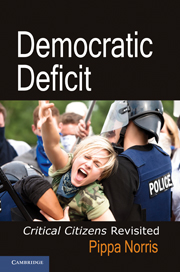Book contents
- Frontmatter
- Contents
- List of Tables
- List of Figures
- Preface and Acknowledgments
- PART I INTRODUCTION
- PART II SYMPTOMS
- PART III DIAGNOSIS
- PART IV PROGNOSIS
- 12 Conclusions and Implications
- Technical Appendix A Concepts and Measures
- Technical Appendix B Countries in the Pooled World Values Survey, 1981–2007
- Technical Appendix C Methods
- Notes
- Selected Bibliography
- Index
12 - Conclusions and Implications
Published online by Cambridge University Press: 05 June 2012
- Frontmatter
- Contents
- List of Tables
- List of Figures
- Preface and Acknowledgments
- PART I INTRODUCTION
- PART II SYMPTOMS
- PART III DIAGNOSIS
- PART IV PROGNOSIS
- 12 Conclusions and Implications
- Technical Appendix A Concepts and Measures
- Technical Appendix B Countries in the Pooled World Values Survey, 1981–2007
- Technical Appendix C Methods
- Notes
- Selected Bibliography
- Index
Summary
More than a decade ago, the original Critical Citizens study brought together a distinguished group of international scholars and seminal thinkers to consider the state of support for the political system at the close of the twentieth century. The core consensus emerging from contributors to the volume was that citizens in many countries had proved increasingly skeptical about the actual workings of the core institutions of representative democracy, notably political parties, parliaments, and governments. At the same time, however, public aspirations toward democratic ideals, values, and principles, or the demand for democracy, proved almost universal around the globe. The tensions between unwavering support for democratic principles but skeptical evaluations about democratic practices was interpreted in the study as the rise of ‘critical citizens.’ The passage of time means that the argument and evidence presented in Critical Citizens needed to be updated to show whether the central thesis continues to resonate today. The extensive anxieties that continue to be expressed about public support for democratic governance suggest that the core message from the earlier volume has not faded, but instead seems more relevant than ever to help explain contemporary developments. Updating and expanding the scope of the evidence and developing more systematic insights into the causes and consequences of the democratic deficit provide an important corrective to the misdiagnosis and exaggeration that is prevalent throughout so much of the literature.
- Type
- Chapter
- Information
- Democratic DeficitCritical Citizens Revisited, pp. 236 - 246Publisher: Cambridge University PressPrint publication year: 2011



